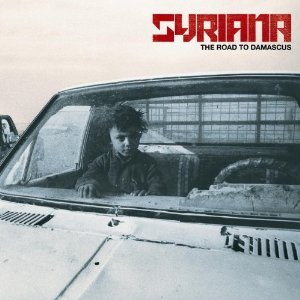With guitars set to "twang" Syriana set off on The Road To Damascus, taking the listener on a trip from the west to the Middle East, where clean tone guitar meets the 83-string qanun, a zither-like update on the old Egyptian harp, played here Syrian musician Abdullah Chhadeh. Syriana have channelled a cinematic vision for this debut album, and as a listening experience the record could almost be broken down into the narrative of an imaginary spy film, set in an Arabic parallel to the Cold War (references of which appear in several song titles – Checkpoint Charlie, Templehof and Black Zil, a Soviet car favoured by the KGB). Syriana’s "soundtrack" features blissful sweeping passages evoking sandy desert plains, the urban, the hustle and bustle of souqs. Fittingly, at recent live shows they were accompanied by a backdrop of old black-and-white films.
The core of Syriana is made up of musicians from both the east and the west, as Chhadeh is joined by the western duo of half-Greek, half-English guitarist, programmer and keyboardist Nick "Dubulah" Page and Irish double bass player Bernard O’Neill. Page’s background includes Transglobal Underground and working with musicians from Mexico to Ethiopia. The traditional, ancient Arabic instruments mix side by side those of the western band members, helping to achieve the stated intention of bridging the political tensions of east and west.
Although mostly instrumental the album also boasts the considerable talents of classically-trained Syrian singer Lubana Al Quntur, who breezes in with the required gravitas to pull off the bold ideas. She is after all a head of vocal studies at the Damascus Conservatoire and a graduate of from the Royal College of Music in London. Her handling of both the Arabic and operatic vocal styles makes her the ideal choice for this ambitious cross-cultural project.
Throughout, western and spy themes creep in alongside the Arabic sounds of the qanun. Some kind of jerky oompah even comes into the mix on third track ‘Gharibb’ (stranger). Full of carnivalesque pomp, musically it is more like eastern European folk than anything obviously Arabic, even when the soprano voice of Al Quntur is introduced for the first time. ‘Black Zil’ features out-there harp work, shifting loosely, but pinned down by sped up trap beats and zoned atmospheric electronic effects.
With hypnotic choppy violins as its starting point ‘Galatian Bridge at Dawn’ becomes an epic eastern mantra, disturbed by a doom-tinged twangy guitar riff. The groove shifts as different instruments transform the original riff and tone of the piece, and intensity builds thanks to soaring violins from the seven-piece Pan Arab Strings of Damascus. The track brims with foreboding intensity, and a distinctly prog leaning. ‘The Great Game’ is another heavy slice of hypnotic swing and repetitive skronk.
Instrumental ‘Al Mazzah’ is one of the few tracks devoted to Chhadeh’s solo qanun playing and is the most pure representation of his music in its usual setting, sitting appropriately as an interlude in the middle of the album. Once again Al Quntur comes to the fore on the (power) ballad ‘Al Araby’, backed by a swirling orchestration of strings.
Album closer ‘Love In A Time Of Chaos’ mixes loose western clean guitar licks, with the patter of a gimbri drum. If anything, the only disappointment is that it stops abruptly just after four minutes into the track when you feel it could go almost anywhere. So, as the final note sharply cuts out of the speakers there’s a feeling of unfinished. Does this journey perhaps have a return ticket?


